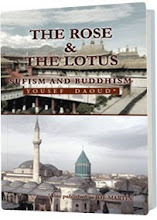 Political and spiritual comment
Political and spiritual commentYousef Daoud
After viewing the highly intolerant exchange between Ayaan Hirsi Ali (Infidel) and Tariq Ramadan on PBS' "Amanpour" concerning the moves by Europe to proscribe extreme veiling in France and Netherlands via the burkha or nikab, I was disturbed by the inability to listen displayed by the two parties. I must say both of these experts protest too much--literally. Ayaan is right, but she paints Islam with a broad brush -- reminiscent of US socialists who hated Stalinism, and so joined forces with McCarthy and the ultra right. She clearly escaped a terrible environment, and endured threats from a vicious minority in Europe. She has been through hell to find freedom and self-expression as a woman. However, all her energies seem to go into being an advocate for the supposedly unavoidable "clash of civilizations."
On the Amanpour interview (Feb 2, 2010, PBS) this became clear. Ayaan Hirsi Ali's severe problems with letting someone with an opposing view speak, reveals her deep frustration. It equally reveals that the degenerate "political" Islam that she has her fight with, has led to an inability to keep a broad perpective on other currents within Islam. She has been rewarded for this with a desk at a well-funded US right-wing think tank -- a phenomenon that is not known to cause people to become more subtle or sensitive in their positions. Meanwhile, Mr Ramadan let the implications and message of the Burkha off too lightly, especially when it is introduced in the European context.
Whatever twisted form of Islam Ms. Hirsi Ali was brought up in – it was surely oppressive and distorted - she has a compulsion to label everyone who adheres to Islam with the same descriptions. They are, to her, ignorant of rational thought and a sense of either justice or freedom. On the other hand, Ramadan feels obliged to treat total body coverings as something with no semiotic "message," but only a freedom of speech issue. That is, the former maintains her right to vent anger and even hatred of the sort which is feeding terrible conflict in the world. The latter apologizes for a fossilized patriarchal version of a religion which was not even part of the picture during the lifetime of its founder. The following passage by an Islamic author 750 years ago, during Islam's Golden Age, gives a much fresher perspective than either of these two "moderns."
_________________________
A 750 YEAR OLD MUSLIM PRONOUNCEMENT ON VEILING
"God has some servants who tell a veiled woman, 'Lift your veil so that we may see your face and know who and what you are. So long as you pass by veiled, we cannot see you, and there is confusion in my mind as to who and what this person is. I am not such as to become infatuated by you if I see your face. For a long time God has made me pure and innocent of you. I am secure enough not to be tempted by the sight of you. On the other hand, if I do not see you, I am confused as to what person this is' " ... "Before 'people of the heart' it is better to unveil the face in order to escape temptation."
Mowlana Jelaluddin Rumi, Fihi ma Fihi, Chapter 42.
(Trans. WM Thackston: Signs of the Unseen)http://joemartinauthor.blogspot.com










No comments:
Post a Comment